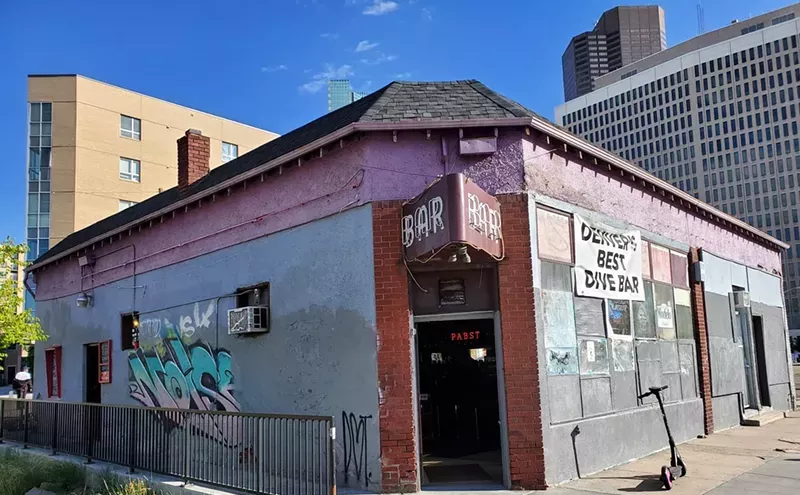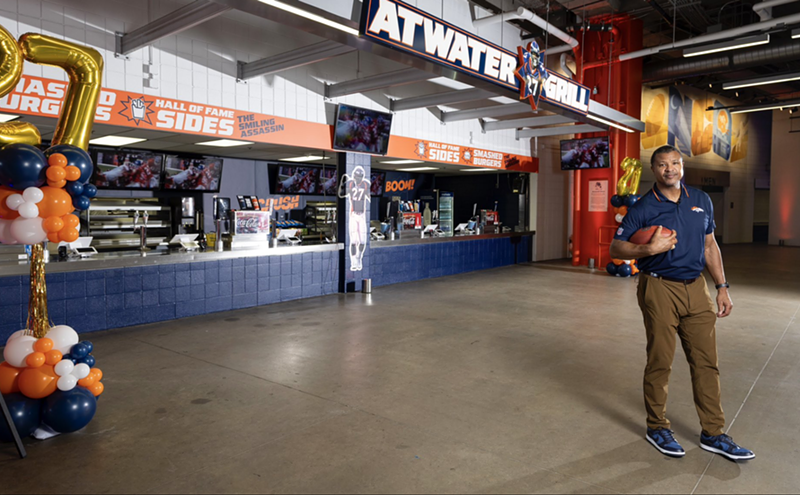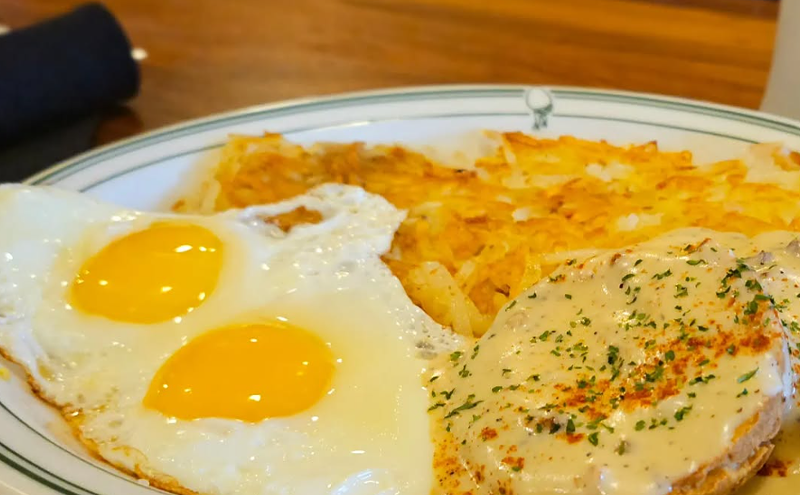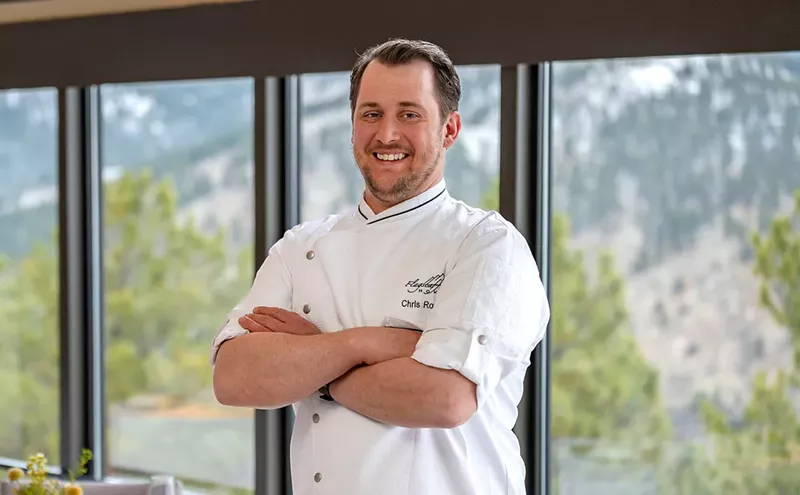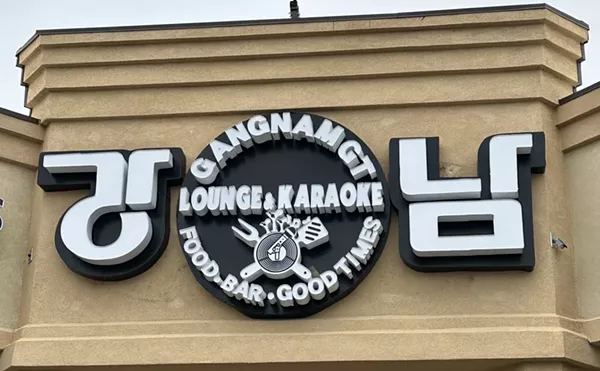"Okay, Ralph," the hostess said cheerfully. (After one look at the crowd, I'd given my name as "Ralph Wiggum," after the nose-picking, perpetually geeky fat kid from The Simpsons -- it felt appropriate.) "It's going to be an hour...." She ran one slim finger down the List. "Maybe an hour and a half. Is that okay?"
What was I going to say, no? Then slink off and grab some Taco Bell? Of course not. I said sure, a ninety-minute wait for Mexican food sounded divine. And no, I didn't have a cell-phone number where she could ring me when a table opened up. I'd just check back in an hour or so to see if the herd had thinned a little, and thank you very much.
"Okay," said the hostess, already smiling past my wife and me at the shivering glitterati piling up in the doorway behind us. "But if you do decide on somewhere else, just call and let us know, okay?"
Unstated subtext: Have fun at Applebee's. I hear the riblets are delicious.
Lola -- the six-month-old coastal Mexican restaurant from Dave Query and Jamey Fader, the people who brought you Jax -- doesn't take reservations. While there was a reason, and a good reason, for this when Lola was still just a concept, it doesn't hold for -- how do I put this gently? -- a phenomenon.
"I just wanted this, you know, not down-and-dirty, but simple place," Fader said when I got him on the phone last week, three days after my Saturday-night visit to his restaurant. He was in bed, suffering from a self-described case of "the bubonic fucking plague" -- which is about the only thing that could keep him off the line, even for one night. Back at Lola, Fader's crew was suffering, too: Their chef was down with the Black Death, the guy coming in to cover was stuck in a broken-down pickup, and the List, even on a Tuesday, was starting to fill up 45 minutes before the doors would even open. "I try to tell people to come in on Monday or Tuesday," Fader explained. "Avoid the three-hour wait. And now they are."
How did this "simple place" wind up drawing such crowds? Fader thinks it's part of natural evolution: In the beginning, you get the people walking by who stop in out of curiosity, and then "you hit a six-month stride, and a certain genre of customer discovers you," he said. "I'm glad to have all and any people who come to my restaurant. But I'm just this old skate rat, you know? Just this scummy little line cook, and all of a sudden there's this University of Denver money coming in and this Cherry Creek money coming in. Sometimes it seems like all of the beautiful people in the city are here."
He's right: On some nights, all of the beautiful people are there. Right now, Lola is probably the only place in Denver that could put up a velvet rope and get away with it. The beautiful people would come, and they'd keep coming, braving the List night after night, weekend after weekend. "It's a whole different animal now," Fader said, while admitting that some of Lola's attraction is beyond even his understanding.
The restaurant doesn't have any of those features that generally act as bait for the swells -- no million-dollar bathrooms, no abstract art on the walls, no bizarre Hispano-Bulgarian-fusion menu, not a stick of Swedish conceptual furniture. The dining room is almost rustic, with its plain tables and straight-backed wooden chairs. Tall pillar candles flicker everywhere, adding warmth to an already bright space decorated with simple touches of glass back-lit in earthy blues and greens that dimple and shine like the placid water of a hidden cove on Baja's western shore. With its chrome stools and blackened-iron fixtures, the bar area looks a little more metropolitan; tall tiers of glass shelves tower behind the bartenders, filled with more candles and more varieties of artsy tequila than you'd think existed in the whole of Central and South America.
Fader, an East Coast mick like me, was none too familiar with peasant Mexican cuisine before he hooked up with Query at Jax. "It was really Dave put this bug on me," he explained. Query was excited about opening an unaffected Mexican place while everyone else in town seemed to be doing upscale, high-end and/or Southwestern fusion, and his interest rubbed off on Fader, who did the obligatory trips sur de las Américas to get a feel for the coastal Mexican flavors that would form the backbone of Lola's menu. Simplicity, purity and the rough-hewn edginess of rustic flavors dominate. "I'm not trying to fool people," Fader said. "Or stump them. I'm just trying to cook good food."
That Saturday, after a wait of more like two hours, we were finally seated at one of the tall, spindly bar tables that weren't really suitable for a multi-course dinner. But then, our first course was unavailable, anyway. We had wanted to try the tableside guacamole service, but our server said all of the good avocados had already been used, and the only ones remaining weren't entirely ripe. Lola got bonus points for this: It's better to be honest than to serve an inferior product. And I was able to sample the wares of the guac cart on a much quieter, more relaxed Monday. The tableside service is slightly invasive if you're uncomfortable with a stranger hovering for as long as it takes him to split, core, peel, season and chop an avocado, but it's also a good time to chat up your server about what's good in the kitchen or on the ninety-bottle-strong tequila menu, or to micromanage the exact composition of your guac. If you're a control freak, your server will even whip up a custom blend -- which leaves no one to blame but yourself if the guac sucks. We went with the "house recipe" -- assembled roughly by pinch, scoop and squeeze, without any silly fuss over measurements -- that combined soft avocado, red onion, garlic, cilantro, chives, habanero, red-chile powder, salt, pepper and a couple wedges of fresh lime for a chunky, thick blend full of raw, bold tastes.
Raw and bold describes much of Lola's menu. The kitchen doesn't do smoky, beef- and pork-heavy Tex-Mex cuisine, nor does it feature the blazing chile heat of central Mexican or borderland fare. Lime, garlic, cilantro, salt and pepper are the main players here; fresh fish, fruit and indigenous starches provide the base for flavors that spike and fall away like the bleeps of an erratic EKG.
From the appetizer side of the menu, we tried costillas, or boar ribs. They were tender and slightly gamey, braised with a sweet barbecue sauce whose flavor came in beneath that of the meat and lit the tastebuds with touches of grilled pineapple, mango, clove, nutmeg, cinnamon and star anise. The rock-shrimp ceviche worked differently, screaming lime! first, last and throughout, but also making room for the more subtle sweetness of ripe mango, sharp edges of onion and the cut-grass taste of cilantro that has always been (and always will be) my least favorite part of peasant Mexican food. The only thing missing in the mix was shrimp: While there were a few, they were small, and their own flavor was buried deep under all the others. The dull, salt-crusted chips were another disappointment; they acted as a delivery vehicle and nothing more.
The big surprise on that part of the menu was the mellow, silky corn-and-avocado soup, a starter so popular that Fader hasn't been able to keep enough of it in the house since opening night. "That was the most amazing afterthought I've ever had," Fader said. The way he tells it, he'd finalized Lola's menu when he realized he was only offering one type of soup. So he grabbed the four ingredients closest at hand -- grilled corn, onion, cream and a little chicken stock -- and mixed 'em up for an uncomplicated, spare soup, a little sweet and very earthy, with a squeeze-bottle doodle of red chile sauce adding kick and a few pieces of ripe avocado adding texture. But nothing got in the way of the taste of pure, puréed corn.
From the entree side of the menu, I tried a pork-and-shrimp estofada (a Spanish stew usually made with braised tongue), whose thin, full-bodied broth carried in its depths the weight of an abuelita's pantry. Yellow-fleshed sweet potatoes lent sweetness to the rice, black beans, tender chunks of pork, tail-on shrimp, onions and stewed tomatoes that filled the plain white bowl; the dish came crowned with half a lobster, perfectly boiled and split tip-to-tail like an anatomy lesson. There was nothing overwhelming or heavy about this dish, which had every reason to be both. Fader's kitchen had exercised perfect restraint, not succumbing to the temptation of adding unnecessary spice -- or unnecessary anything -- to a centuries-old preparation designed to be soothing, full and hearty exactly as it is. The salmon tacos were excellent, too. Like the costillas, the salmon had been mopped while on the fire with a sweet barbecue sauce; the pink flesh was grill-black on the outside, tender and soft within. The naked salmon came with a side of Mexican crema, gently spiced beans fortified with fat chunks of stew pork, wilted greens and extra sauce. It was simple, messy food, simply and messily cooked -- the kind of food you eat with your fingers, the kind that goes perfectly with a cold beer and a suntan.
But then what should have been a basic exercise -- chicken carnitas, the obligatory chicken dish at a mostly seafood restaurant -- was mangled by a staggering amount of mistakes. For starters, the tamal that was supposed to be filled with black beans, guero chile and cotija cheese was just plain masa, and not even very tasty masa, wrapped in a husk and topped with a dark mole that had the consistency of food but tasted like paste. This time, the spiced beans in which everything swam had less depth of flavor than saltwater, and frankly, I would rather have eaten that corn husk than the chicken, which had all the texture of wet Styrofoam and tasted like nothing but sweaty air.
One botched plate is not enough to condemn a restaurant, however, and obscene popularity is no reason to avoid it. Besides, when Lola is quiet, it's exactly what Fader expected. Exactly what I expected. The food matches the service which matches the decor which matches the casual vibe and tradewinds feel of the entire place, which seems like a favorite beachside hotel restaurant in a dead-end Mexican coast town that hasn't yet been overrun by chi-chi eco-tourists and cruise-ship crowds. But then there are Saturdays. And the List.
Fader knows he has a great location, the right kitchen, the right crew and a good handle on the bare, bold flavors of his menu. And if the wait on Saturday night is a little longer and the crowds outside the door are a little fancier than he expected? Well, he's taking it all in stride.
"It's good to be out of LoDo," he said. "Definitely. That's good for my soul. It's great to have the money to do the place we want."
And then he laughed. "But also, everything's different," he said, voice still scratchy with the plague but also a little sad, like a kid suddenly given everything he ever wanted only to realize none of it was exactly what he expected. "It's a whole different animal now."



